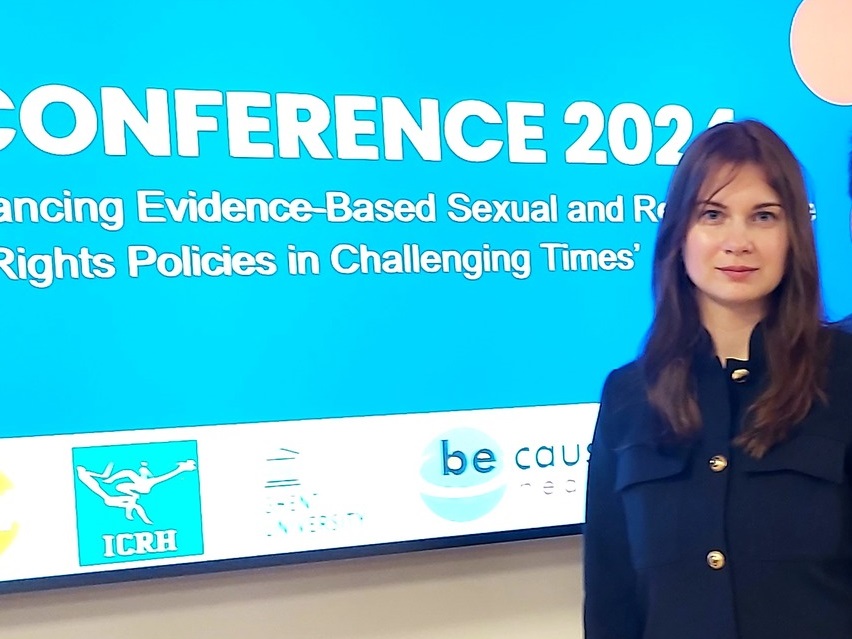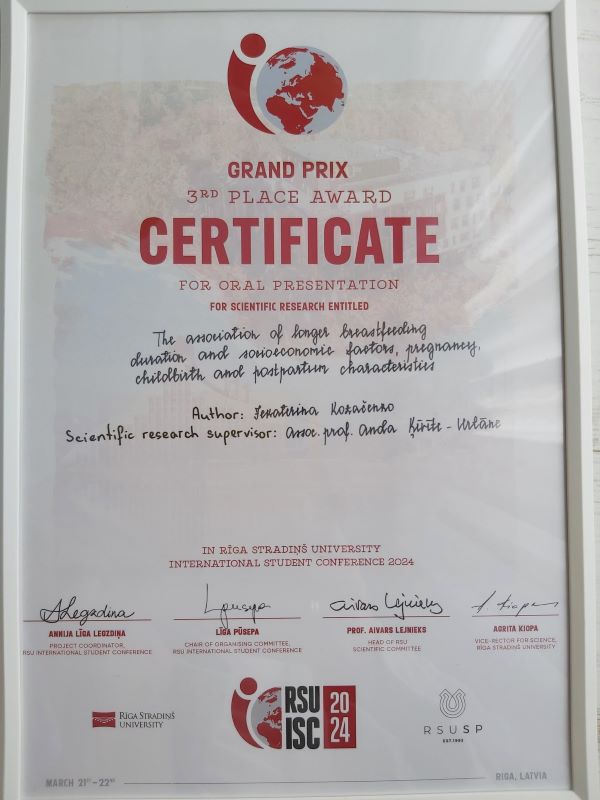RSU International Student Conference award-winner Jekaterina Kozačenko: ‘breastfeeding acts like the first vaccine’
Jekaterina Kozačenko, a senior laboratory technician at the Rīga Stradiņs University (RSU) Institute of Public Health and a student in the Public Health master's degree programme, was awarded 1st place in the Public Health, Occupational Medicine, Nutrition Science, Rehabilitation section at this year's RSU International Student Conference (ISC).
 Photo from private archive
Photo from private archive
Her study was titled “The association of longer breastfeeding duration and socioeconomic factors, pregnancy and postpartum characteristics”. In the conference-wide competition she won 3rd place among 17 finalists from other sections (gynaecology, traumatology, and others).
‘As a mother of a young child myself, I was interested in finding out why some babies breastfeed for longer than others. And as a public health specialist, it was important for me to understand which women would need more help with this issue,’
said the author of the study.
Statistical data from the Centre for Disease Prevention and Control from 2022 indicates that only 27.4% of Latvian mothers breastfeed their children until the age of one. This does not correspond with recommendations from the World Health Organisation’s (WHO) or the Ministry of Health. The WHO recommends exclusive breastfeeding of infants for the first 6 months of life (i.e., without offering water or supplementary feeding) and continuing breastfeeding with complementary foods until the child is two years old or longer, according to the mother's and child's wishes or needs.
Using secondary data from an RSU Institute of Public Health study on factors and practices affecting sexual and reproductive health in Latvia, the author conducted a multifactor analysis to determine which factors influence prolonged breastfeeding (7+ months) among Latvian mothers.
‘Breastfeeding is like the first vaccine because breast milk contains all the necessary nutrients, antioxidants, vitamins and protects the baby from infectious diseases.
In turn, a breastfeeding mother has a reduced risk of postpartum haemorrhage and a reduced risk of breast and ovarian cancer,’ said Kozačenko.
Her study shows that women with lower education levels, smokers, first-time mothers, and Russian speakers are at risk of breastfeeding for a shorter period. ‘We need to focus on these women when planning health promotion activities in Latvia,’ Kozačenko emphasises.
Another factor that increases the likelihood of breastfeeding for a longer period is initiating breastfeeding immediately after childbirth. This is confirmed by the WHO recommendations.
Jekaterina Kozačenko received a monetary prize from the Latvian Association of Healthcare Management Professionals and the magazine Doctus at the closing of the student conference.
 Foto no privātā arhīva
Foto no privātā arhīva
The young researcher expresses her gratitude to her scientific supervisor Anda Ķīvīte-Urtāne for her support and advice, the conference’s jury for highly appreciating her work, and the Institute of Public Health for supporting students in their research work.
Related news
 RSU adopts amendments to its Code of Ethics to uphold professional ethics requirementsFor Students, For RSU Employees
RSU adopts amendments to its Code of Ethics to uphold professional ethics requirementsFor Students, For RSU Employees


